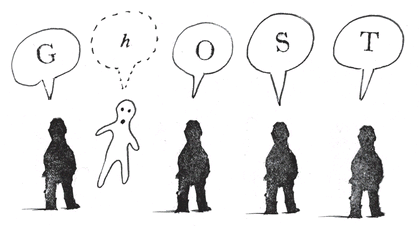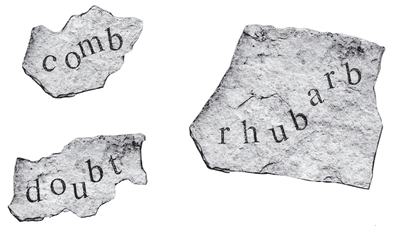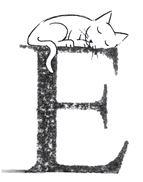The Word Snoop (4 page)
Authors: Ursula Dubosarsky
So why are those silent letters there? Well, it’s all because of the mixed-up history of the English language. Remember how English began in about the fifth century AD when people from Germany settled in Celtic-speaking England? And then those Latin-speaking Christian monks turned up, followed in the ninth century by Norse-speaking Vikings? And then finally William the Conqueror appeared in the eleventh century with his French-speaking friends and conquered them all? (Why couldn’t they all just stay quietly at home curled up sensibly by the fireside?)
Goodness. Celtic, German, Latin, Norse, and now French speakers, each with their own language, alphabet, and system of spelling—it’s a mystery how anybody understood each other! And actually, because William the Conqueror spoke French, for a while there French even became the official language of England. This is where quite a few of our silent letters crept in, from French words, where the
h
was not pronounced. For example, the silent
h
in
h
our comes from the French
h
eure (pronounced, um, “
er”).
I bet you can think of a few others like that. (Can’t you?
H
onestly?)
h
was not pronounced. For example, the silent
h
in
h
our comes from the French
h
eure (pronounced, um, “
er”).
I bet you can think of a few others like that. (Can’t you?
H
onestly?)
Funnily enough, around this time people started putting letters into English words that weren’t even French in the first place, to make them look more French. That’s how the
u
was added to the original Latin word
color
—and it’s still spelled “colour” like this in many English-speaking countries. (Though not in the U.S.!) Then other people thought it would be good if English looked more like Latin, so a
b
, for example, was dumped back into the word dou
b
t, even though it had been taken out because no one pronounced it that way anymore. And have you ever wondered about words like
psalm
and
rhubarb
? (Well, I have.) They came from ancient Greek words, which had ancient Greek letters,
psi
and
rho
. Oh, why couldn’t they just leave poor old English alone!
u
was added to the original Latin word
color
—and it’s still spelled “colour” like this in many English-speaking countries. (Though not in the U.S.!) Then other people thought it would be good if English looked more like Latin, so a
b
, for example, was dumped back into the word dou
b
t, even though it had been taken out because no one pronounced it that way anymore. And have you ever wondered about words like
psalm
and
rhubarb
? (Well, I have.) They came from ancient Greek words, which had ancient Greek letters,
psi
and
rho
. Oh, why couldn’t they just leave poor old English alone!
So that’s an explanation for some of our silent letters. Another important thing to know is that quite a few of today’s silent letters have not always been so quiet. The word knight, for example, used to be pronounced in English with the
k
and the
gh
sounded out (
ke-nee-g-hht
), as were many of the silent
e
’s and
l
’s. And the silent
w
in words like
w
reck or
w
rite was originally there to show a funny sort of Old English
r
sound that was different from the ordinary
r
. But over time the way people spoke English changed, even though the spelling didn’t.
k
and the
gh
sounded out (
ke-nee-g-hht
), as were many of the silent
e
’s and
l
’s. And the silent
w
in words like
w
reck or
w
rite was originally there to show a funny sort of Old English
r
sound that was different from the ordinary
r
. But over time the way people spoke English changed, even though the spelling didn’t.
And don’t forget The Great Vowel Shift . . .
The what?
This strange happening started during the fifteenth century. What it meant was that gradually people began to change the way they said their vowels (a, e, i, o, u)—the sounds
shifted
to a different part of their mouth. Up until The Great Vowel Shift, a word like
met
was pronounced more like our word
mate,
and
goat
was pronounced more like
goot
. (Try saying them out loud and you’ll see what I mean about your mouth.) Anyway, with these changes of pronunciation going on all over the place, letters in words appeared and disappeared as people wrote them down differently, and it all got even more confusing.
shifted
to a different part of their mouth. Up until The Great Vowel Shift, a word like
met
was pronounced more like our word
mate,
and
goat
was pronounced more like
goot
. (Try saying them out loud and you’ll see what I mean about your mouth.) Anyway, with these changes of pronunciation going on all over the place, letters in words appeared and disappeared as people wrote them down differently, and it all got even more confusing.
All right, you say, but this was hundreds of years ago. Why do we still use spellings based on how people
used
to speak?
used
to speak?
Well, around the time of The Great Vowel Shift something truly extraordinary happened.
Are you ready . . . ?
The Invention of PrintingWhat happened was something that truly CHANGED THE WORLD. It was a technological invention from Germany, which was just as amazing as the invention of the television or computers or the Internet.
This invention was—wait for it—the printing press! Now, while types of fixed printing, called block printing or stamping, had already been used in China for centuries, the mechanized printing press, with letters that could be moved around, was a brand-new invention that changed everything. Why? Well, believe it or not, until then all books in Europe had to be copied out by hand—usually by monks. It took ages just to make a single book, so there weren’t many books around. People traveled for miles, even to different countries, just to read a book that was kept in a particular library.
But when Johannes Gutenberg invented the printing press in 1440, it meant that machines could print onto paper over and over again, and then the paper could be bound into books. By the end of the fifteenth century, there were thousands of books in print all over Europe. (Those lucky monks could heave a big sigh, put their pens down, and have a nice bath instead!)
In England, a printing press was set up in 1476 by a man called William Caxton. Although people spoke and spelled English differently all over the country, Caxton decided to print books in the type of English that people used in the biggest city—London. This is the kind of English that we now call Modern English, and it’s basically what we speak and write—and spell—today.
Printing was very important for spelling, because the decision of how to spell words was left largely to the people running the printing press (just as before it had been left largely to the monks who copied the books out). The problem was that quite a lot of the printers were from Europe, and English was not their first language. So, even if they were good spellers, it was easy for them to make mistakes. ( Just imagine us Word Snoops trying to decide how to spell something in Spanish,
por ejemplo
. I mean, for example!) This is thought to be the reason for the silent letter in the word g
h
ost, which was originally spelled without an
h
. Printers from Holland put the
h
in, because that’s how they spelled it in their language.
por ejemplo
. I mean, for example!) This is thought to be the reason for the silent letter in the word g
h
ost, which was originally spelled without an
h
. Printers from Holland put the
h
in, because that’s how they spelled it in their language.
But that was just one complication. Printers also affected spelling because they wanted printed pages to look nice and neat, with all the lines ending at the same place. (This is called justifying—you might have seen this option on the computer.) In order to make printed lines longer or shorter, sometimes printers would decide to add an extra letter (an
e
, for example), or leave one off. This happened especially with what you might call unnecessary letters—such as the
k
, which used to be put at the ends of words like
music
(music
k
) and
logic
(logic
k
).
e
, for example), or leave one off. This happened especially with what you might call unnecessary letters—such as the
k
, which used to be put at the ends of words like
music
(music
k
) and
logic
(logic
k
).

Now, once something’s printed out, it can be hard to change. This was especially true back in the days when printing began, as one of the most popular books in print was the Bible. The printers felt very nervous about changing anything in the Bible, even if it didn’t look quite right.
Even more importantly, there was still no such thing as a standard dictionary with agreed “correct” spellings that the printers could look up to check a word as we would today. And let’s face it, in the old days they didn’t have quite the same idea of correct spelling as we do, anyway. The poet Geoffrey Chaucer, who wrote the famous
Canterbury Tales
in the fourteenth century, even seemed to have spelled a similar word two different ways in one sentence! See if you can spot it.
Canterbury Tales
in the fourteenth century, even seemed to have spelled a similar word two different ways in one sentence! See if you can spot it.
Nowher so besy a man as he . . . And yet
he semed bisier than he was.
he semed bisier than he was.
But the arrival of printing meant that people became more interested in the idea of standard spelling and how a word should be written. They realized it would make life much easier for everyone if the spelling of a word was always the same.
This led to the beginnings of English dictionaries. The most famous and fascinating of the early English dictionaries was that of Dr. Samuel Johnson, published in 1755. Dr. Johnson loved the English language so much that he wanted to make sure its wonderful words would be looked after properly. He read thousands and thousands of books, letters, poems, and plays—and more—to find what he thought was the best spelling and meaning for a word.
So, next time you read a sentence, you’ll realize you’re seeing something very special. It may be that the word is spelled how it was pronounced hundreds of years ago, or according to a fashion, or just by mistake or confusion, or because somebody liked it like that. But all of those amazing spellings have been preserved, even frozen in the language, like fossils trapped in amber . . .

By the time Dr. Johnson was writing his dictionary, people from Britain had begun to roam around the world in ships and make settlements in lots of different countries. This was the beginning of something known as the British Empire. And just as William the Conqueror brought the French language with him to England when he conquered it, so these English people brought along English to all the different places they went. They spoke it, taught it, and published newspapers and books in it.
That’s why English is spoken in so many different parts of the world—North America, Australia, Africa, and India, just to name a few. And in each place, naturally enough, a different kind of English developed, not just in accents or the way people pronounce words, but also in ways of making sentences and types of words—and yes, spelling.
Now, as you already know, not everybody likes English spelling, and there have been many calls to fix it up and get rid of things like silent letters. Probably the most successful act of spelling reform took place in the United States in the eighteenth century after the American Revolution, when America became independent from Britain. During this time, a man by the name of Noah Webster (remember him from Chapter 1?) decided to write a dictionary of American English. He saw it as a big chance for a new country to improve all that pesky British spelling. Webster was particularly eager to get rid of what he described as “
silent letters; as a in bread. Thus bread, head, give, breast, built, meant, realm, friend, would be spelled, bred, hed, giv, brest, bilt, ment, relm, frend. Would this alteration produce any inconvenience, any embarrassment or expense? By no means
.”
silent letters; as a in bread. Thus bread, head, give, breast, built, meant, realm, friend, would be spelled, bred, hed, giv, brest, bilt, ment, relm, frend. Would this alteration produce any inconvenience, any embarrassment or expense? By no means
.”

Well, he didn’t get everything he wanted (by no means!), but he did succeed in removing some silent letters from American spelling, like the
u
from colo
u
r (I mean, color), and the
gue
ending from words like dialo
gue
(I mean, dialog). But American English still has plenty of silent letters left behind that nobody seems able to chase away.
u
from colo
u
r (I mean, color), and the
gue
ending from words like dialo
gue
(I mean, dialog). But American English still has plenty of silent letters left behind that nobody seems able to chase away.
Over the centuries, thousands of dedicated, clever, and passionate people throughout the English-speaking world have argued sensibly and intelligently for spelling reform but, apart from Noah Webster, nobody’s had much success. Although with e-mails and texting you can see there are some differences creeping in . . .
But I don’t know, maybe we’re all secretly fond of these silent letters. They’re a bit like stray cats that wander into the house. After a while you just get used to seeing them there, and you might miss them if they went away. They remind you of all the people who have been speaking English for hundreds and hundreds of years before you.
Other books
RavenShadow by Win Blevins
The Hypnotist by Lars Kepler
Burning Blue by Paul Griffin
Snowfire by Terri Farley
Cobra by Frederick Forsyth
El reino de este mundo by Alejo Carpentier
Escape from Shanghai by Paul Huang
I Dream of Zombies by Johnstone, Vickie
Big Brother by Lionel Shriver
In Tasmania by Nicholas Shakespeare